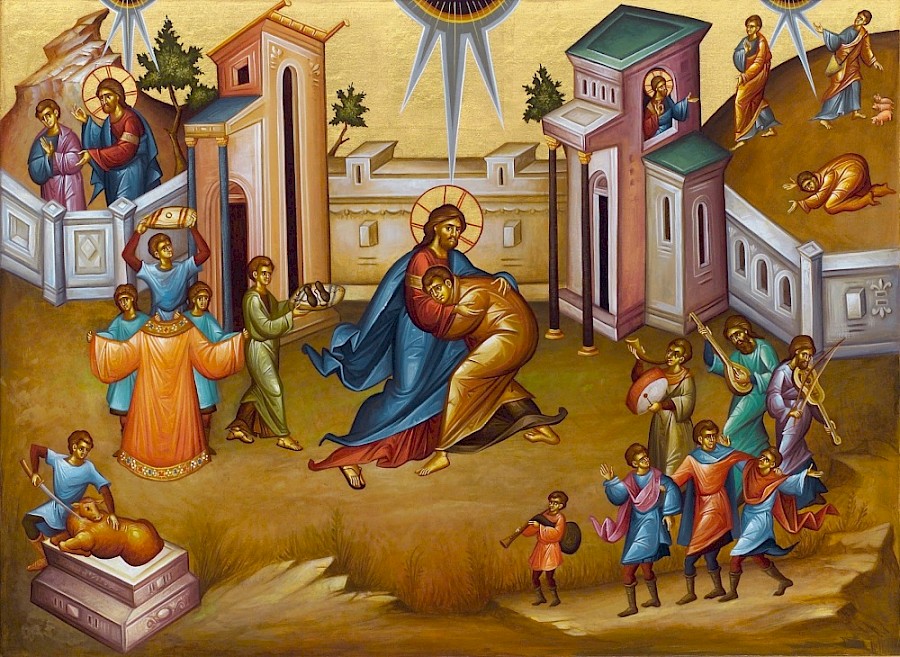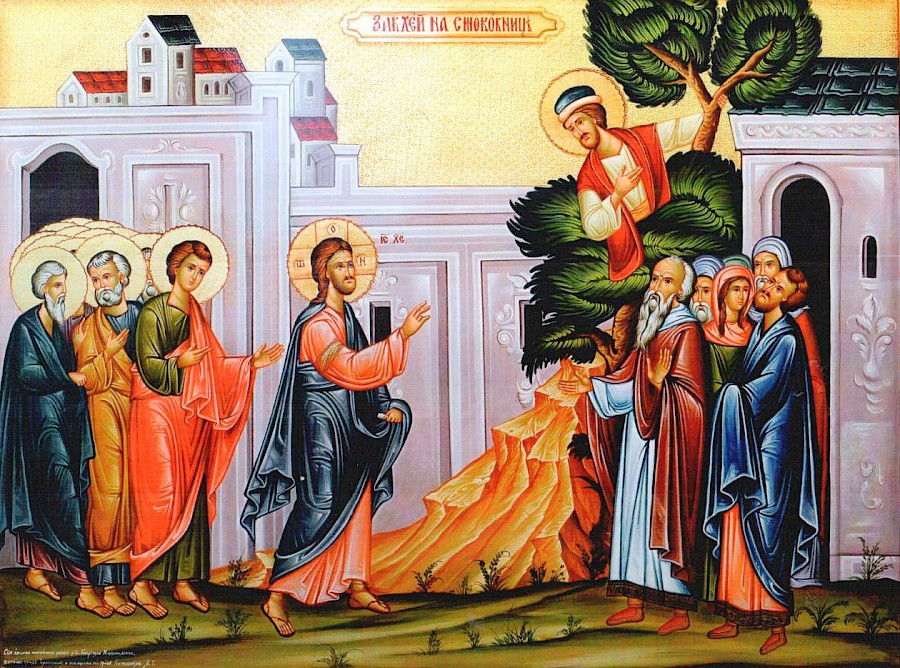
Οn this day we commemorate the Second Coming of our Lord Jesus Christ, the righteous Judge.
The most-godly Fathers placed the present commemoration of the Second Coming of Christ after the two parables of the preceding Sundays so that no one, having learned of God’s love for mankind, might lead a life of negligence, saying to himself, “God loves mankind, and when I finally cease sinning, everything will go easily.”
Hence, they appointed the remembrance of that fearful day in order to frighten the negligent with the thought of death and the anticipation of the future torments and rouse them to the acquisition of virtue so that they will not merely trust in God’s love for man but also bear in mind that He is a just Judge who rewards everyone according to his deeds.
23.02.2025Read more

On this day, Soul Saturday, according to the order instituted by our Holy Fathers, we call to remembrance all those who have died from the beginning of the ages in faith and in the hope of the resurrection and of life eternal.
The present commemoration of the dead is based on the reality that many of our fathers and mothers, brothers and sisters died under such circumstances that funeral prayers and normal memorial services could not be offered for them. Either in a foreign land or on the seas, on impassable mountains or in gulfs or precipices, through starvation or diseases, in wars, in fires, or during earthquakes, and in so many other ways, perhaps in poverty or in need, our known and unknown brothers and sisters in Christ did not enjoy the chanting and necessary spiritual care. Therefore, our Holy Fathers, moved by their love for humanity, appointed the present celebration to take place in the Church everywhere, having received this from the Holy Apostles, so that all who have died through various mishaps or accidents may be remembered together, for the benefit of their souls. There is great profit to the soul from these memorials in the Church. This is the first reason.
22.02.2025Read more

Today, the Sunday of the Prodigal Son, we call to remembrance the noble parable that is in the Holy Gospel according to the Apostle Luke.
There are people, as they live prodigally from their youth, who observe in themselves many improper things. Spending their time in drunkenness and wantonness, they have fallen into a depth of wickedness and reached despair, which is a result of pride. Yet they do not wish to engage in the pursuit of virtue because, as they say, their evils are very many. And so they continually fall into the same and worse evils. For this reason, in their paternal and loving care for such people, the Holy Fathers placed this parable on this day, wishing to save them from despair, and by showing God’s forbearance and plenteous goodness, they aim to entirely uproot such passions ol prodigality from sinners’ hearts and to inspire them to take up a virtuous life again. The Fathers’ purpose is to show, through this parable of Christ, that there is no sin whatsoever that can prevail over His love for mankind.
16.02.2025Read more

On this day we commemorate the parable of the Publican and the Pharisee, which occurs in the Holy Gospel according to the Apostle Luke.
With God’s blessing, we enter this day into the period of the Triodion, in which many of our holy and godly Fathers who were hymnographers inspired by the Holy Spirit composed hymns and odes. St. Cosmas, Bishop of Maiuma (comm. Oct. 14), a famous ecclesiastical poet and hymnographer, was the first to devise the pattern of the three-ode canon (tri-ode = Triodion), in the image of the life-originating Holy Trinity. He first used this model in his canons for the Great and Holy Week of the Passion of our Lord God and Savior Jesus Christ, composing the hymns and using acrostics containing the names of the days of that week. Then the rest of the Fathers, and particularly Saints Theodore (comm. Nov. 11 and Jan. 26) and Joseph (comm. April 3) the Studites, in zealous imitation of St. Cosmas, composed canons for the other weeks of Holy and Great Lent. When they had further arranged and ordered the odes and collected and compiled the book’s other material from the different Fathers, they first used it in their own Monastery of the Studion in Constantinople.
09.02.2025Read more

On this day, the Sunday before the beginning of the Lenten Triodion, we commemorate the repentance of the tax-collector, the Holy Apostle Zacchaeus, who desired to behold Christ.
The Holy Fathers placed today's commemoration here to prepare us, little by little, for dawning season of Great Lent. Knowing that we are basically slow to exhibit a desire for repentance, the Holy Fathers, by Zacchaeus' example, teach us in these preliminary weeks the need to recognize our sins and our need to turn away from them.
02.02.2025Read more

In the Name of the Father and the Son and the Holy Spirit.
As we celebrate the Epiphany, we remember how God revealed himself as the Trinity, that Jesus appeared to the people as Christ. Where did Christ appear Hos did He begin His mission? Did He enter a great city and reveal Himself in His glory? Did He ascend a great mountain as many thousands of people beheld Him from below, wondering at the miracle? No! Christ went into the wilderness, to the Jordan River, where John was baptizing the people. John preached repentance, and called upon sinners, in a sign of repentance, to be baptized in the Jordan. And it was as a sinner that Christ came and asked for baptism. Yet He had no sin. John was afraid: “I have need to be baptized of thee, and comest thou to me? And Jesus answering said unto him, suffer it to be so now: for thus it becometh us to fulfil all righteousness” (Matthew 3:15). Adam sinned through pride, he wished to elevate himself, to become like God. But Christ cam to fulfill the truth of God, to correct Adam’s pride through humility. Christ entered the water and received baptism from His servant. Trembling, John placed his hand upon his God and Master, and Christ humbly bowed His head. Christ’s humility opened up the heavens, and the voice of God the Father boomed forth: “This is my beloved Son, in whom I am well pleased” (Matthew 3:17). This is My Son, Who humbled Himself in order to fulfill My will, My true Son, Who humbles Himself in order to elevate mankind. Christ’s meekness opened the heavens and revealed to mankind the Trinitarian nature of God.
19.01.2025Read more

Behold a new and wondrous mystery.
My ears resound to the Shepherd’s song, piping no soft melody, but chanting full forth a heavenly hymn. The Angels sing. The Archangels blend their voice in harmony. The Cherubim hymn their joyful praise. The Seraphim exalt His glory. All join to praise this holy feast, beholding the Godhead here on earth, and man in heaven. He Who is above, now for our redemption dwells here below; and he that was lowly is by divine mercy raised.
Bethlehem this day resembles heaven; hearing from the stars the singing of angelic voices; and in place of the sun, enfolds within itself on every side, the Sun of justice. And ask not how: for where God wills, the order of nature yields. For He willed; He had the power; He descended; He redeemed; all things yielded in obedience to God. This day He Who is, is Born; and He Who is, becomes what He was not. For when He was God, He became man; yet not departing from the Godhead that is His. Nor yet by any loss of divinity became He man, nor through increase became He God from man; but being the Word He became flesh, His nature, because of impassability, remaining unchanged.
07.01.2025Read more

The Feast of the Entrance of the Theotokos in the Temple is believed to be not among the most ancient festivals of the Church. However, indications that the Feast was observed in the first centuries of Christianity are found in the traditions of Palestinian Christians, which say that the holy Empress Helen built a church in honour of the entry of the Most Holy Theotokos into the Temple. Saint Gregory of Nyssa, in the fourth century, also mentions this Feast, along with Saints Jerome and Epiphanius. Saint Andrew of Crete had known about it and his hymns are found throughout the Service books for this Feast. Saint Germanos I, Patriarch of Constantinople from 715 to 730, wrote two homilies for the Feast. Saint Tarasios, the Patriarch, introduced it at Constantinople a century later as an official Feast, though it had already been celebrated. Saint George of Nicomedia wrote three sermons on the subject which address every detail of the Feast, including a beautiful homily which addresses rhetorically the temple itself.
1. Every divine festival, whenever it is celebrated, spiritually fills those who are present from a treasury and divinely flowing spring. But even more and beyond other feasts does this recently hymned festival, brilliantly celebrated, attract the soul with holy joy and gives more joy in proportion to the preeminence of the excellent child of God. For the annual observation of this feast is coming, in which one must be pure to participate.
And let us be anointed with the perfume of her roses, as Solomon says in the beautiful verse of his Song: "Who is that who comes up from the wilderness, perfumed with myrrh and frankincense, with all the fragrant powders of the merchants?" (Song of Songs 3.6) - "Come hither from Lebanon, my bride; come hither from Lebanon" (Song of Songs 4.8).
So let us eagerly approach together this mutually beneficial, salvific feast of the Mother of God. And bowing before the unapproachable place [the Holy of Holies] let us watch the child going toward the second veil, Mary the all-holy Mother of God who put an end to unfruitful sterility, and exchanged the mere shadow of the letter of the law (cf Hebrews 1O.1) through the grace of her birth-giving.
04.12.2024Read more

Today, dear brethren, we celebrate the glorious feast of the lightning-like Archangel Michael and all the heavenly bodiless powers. On this day let us talk of the boundless world of the angels; of their nature, of their hierarchy, and of the infinite mercy of God which has added us, Orthodox Christians, to this angelic host and has a formed a single Church made of angels and men; and subsequently of our responsibility to venerate them in a worthy manner and try to emulate them as our future compatriots in the celestial homeland; for which we earnestly pray to God, our common Creator.
St. Cyril of Alexandria says: If our earth, which serves as a focal point between two worlds, carries upon itself such a countless multitude of people and various other creatures, then how many times greater is the number of denizens inhabiting the immaterial heaven, which is so immense and incomprehensible to the mind?
21.11.2024Read more

Brothers and sisters! Did you know that there exists a psychological law by which under the influence of thought, a feeling, a desire is kindled; and from desire comes action. This law was discovered back in the first centuries by the Fathers of the Church, and then it passed on into secular life. In any sphere of life, there isn’t a single action which is not provoked by feeling and desire. And in their turn, feeling and desire are kindled by thought; just as any flammable substance will catch fire if, for a sufficient length of time, one holds over it a magnifying glass through which a ray of sun is concentrated. And so: thought — feeling — action.
Both readings for this Sunday, the Apostle and the Gospel, are in a wonderful way connected with this law. Even more: without this law we wouldn’t even be able to understand them in all their depth. The Gospel tells us about the Sower, the seed, and the ground. Different kinds of ground are mentioned: the ground by the wayside, the stony ground, the ground overgrown with weeds, and finally, good ground.
The Sower is the Lord, the seed is the Word of God, and the ground is the listener — you and our hearts. And this parable ends with the words: "But that on the good ground are they which in an honest and good heart, having heard the word, keep it, and bring forth fruit with patience" (Lk. 8:15). This means that the purpose is such: we must accept the Word of God with all our being, with all our mind, with a good and pure heart. And it is impossible to express this good, pure heart in stronger words than in the words of the Apostle Paul in today’s reading: "For I through the law am dead to the law, that I might live unto God. I am crucified with Christ: nevertheless I live; yet not I, but Christ liveth in me: and the life which I now live in the flesh, I live by the faith of the Son of God, Who loved me, and gave Himself for me" (Gal. 2:19-20). This is what we should strive for; here is the purpose of our life.
16.11.2024Read more










